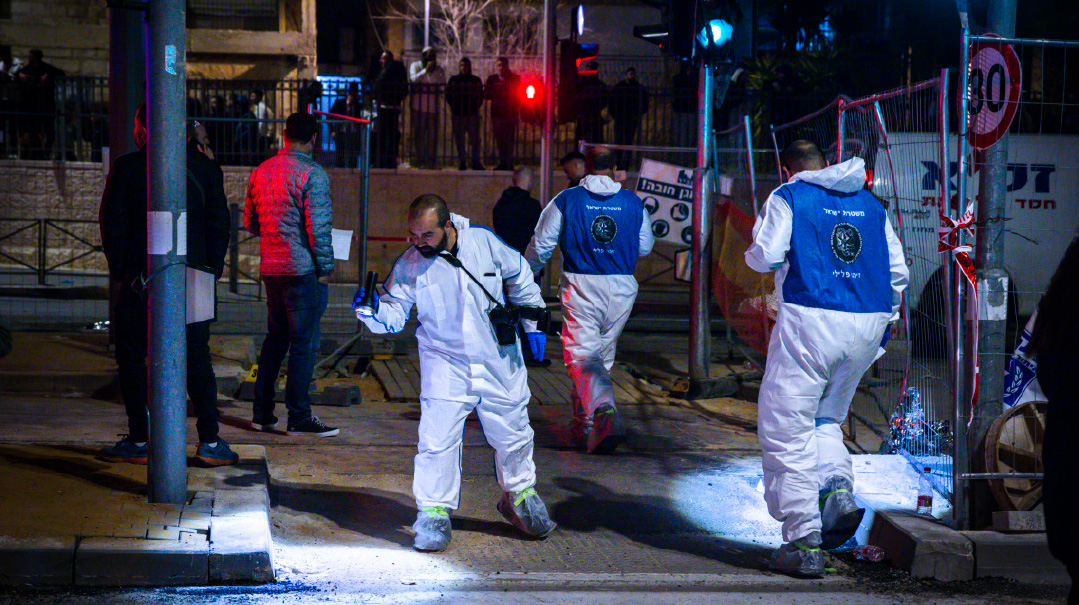How Jews Mourn

We don’t commemorate tragedy with flowers; instead, we say Kaddish, acknowledging the Divine inner core of events, however harsh they seem

The drawn-out scream of sirens is the sound that every Yerushalmi fears — a signal that terror has returned to Israel’s capital.
No longer a resident of the city, I first heard of the Neve Yaakov massacre on Motzaei Shabbos. But having seen the aftermath of too many attacks over the years, the news brought to mind the traumatic combination of sound and light that follows these attacks.
As I walked over the ground where these kedoshim had fallen shortly before, in preparation for the report that appears later in this magazine, I was struck by two recurring thoughts.
One is the chilling sense of how transient our horror is. Surely, at a scene of such slaughter, there should be something dramatic to mark the spot — a pillar of fire, a thundercloud, a pool of seething blood to commemorate the evil that has taken place?
Instead, there is nothing. People have died, lives have been taken in a horrific spectacle of violence, and the earth, as it were, covers their blood.
A day after the bomb attack at a bus stop at the entrance to Jerusalem a few months ago in which a teen, Aryeh Shupak, was killed, I stood at that same bus stop — one that I use a few times a week — and noted the same eerie absence of memory.
A tattered, handwritten sign proclaimed the eternity of the Jewish People, and that was it.
The very absence of fitting commemoration seemed an enormity.
Life must go on, we sigh, and so — assuming it wasn’t our nearest and dearest who were taken — we continue with the banality of normal existence.
How many of us take anything to heart, even when we tread the ground where the gunfire echoed, all the more so when it’s a remote item on the news?
A second, related thought occurred to me once again when viewing footage of this week’s massacre.
If you look into every attack, there are the miracle stories. The man who should have been on the bus; the child who was delayed for some mysterious reason.
In Neve Yaakov, too, timing was everything. Had the terrorist arrived an hour earlier — post-tefillah — or later, when more locals had finished their Shabbos meal, the carnage would likely have been far worse.
And security camera footage shows something odd. Shortly before he opened fire on defenseless men, women, and children, the gunman passed a woman walking with a child.
For some reason, he didn’t shoot, and they were saved.
Perhaps his gun wasn’t loaded; it’s possible that he hadn’t steeled himself for the act of killing. With the murderer dead, we’ll never know the proximate reason. But clearly, the giant hand of Hashgachah intervened to save these lives.
We don’t commemorate tragedy with flowers; instead, we say Kaddish, acknowledging the Divine inner core of events, however harsh they seem. May whatever chizuk that we derive from the horror be l’illui nishmas the seven Jews whose lives were cut short in the ultimate Kiddush Hashem.
Too Early To Tell
Chinese premier Zhou Enlai’s 1972 response when asked about the effect of the French Revolution is a classic example of an obscure comic genre — foreign-policy repartee.
“It’s too early to tell,” he’s widely quoted as saying.
The joke, however, is on those who quote the exchange as an example of far-seeing Confucian wisdom: apparently Zhou didn’t mean the 1789 revolution — he had in mind the student uprisings of 1968.
Whatever Zhou (pronounced Joe or chew) meant, some trends really are too early to know in the short term.
Below are three un-Zhou-esque trends arising from current events — ones that look clear in the here-and-now — that I think are worth chewing over.
Ukraine for NATO
How far will the West go in arming Ukraine? As of last week, a combination of battlefield success and guilt-tripping America and Europe worked to enable the Ukrainians to cadge everything from radios to tanks. This week’s news is that the Pentagon is seriously considering sending the blue-and-yellow team modern jet fighters as well.
If that happens, my prediction is that a NATO membership — the ultimate prize for Kyiv — would be on the cards. That’s because the deployment of expensive, advanced systems like F-16 fighters would be an indication that Western countries were absolutely, irrevocably committed to the long haul of ensuring their arms triumphed against those of Russia. A formal security guarantee would be a medium-range hop from there.
American Strength
In this space last week, I noted how the Ukraine war had opened the door for a comeback in US credibility on the world stage. Interestingly, the ongoing battle between the White House and Republicans over the debt ceiling — a battle often touted as a sign of DC’s decline — could equally be seen as a manifestation of American power.
After all, which other country could flirt with default and survive? Yet both sides’ willingness to go to the wire on this is testament to the reality that in every financial crisis — even one Made in the USA — investors treat the dollar as a safe haven, hence its enduring value.
Retail Politics
The last is an open question: Does glad-handing still matter in politics? Ron DeSantis is hoping that the answer is a negative. As my profile of the Florida governor a while back noted, he’s not got that common touch. Doubtless tipped off by that Mishpacha cover story, Politico recently backed up that assertion extensively. When DeSantis’s shadow candidacy is exposed to the daylight of the campaign trail, we’ll discover whether competence, woke-bashing, and unflinching conservatism win over the GOP faithful, or whether you still need to be good at connecting with voters.
(Originally featured in Mishpacha, Issue 947)
Oops! We could not locate your form.







